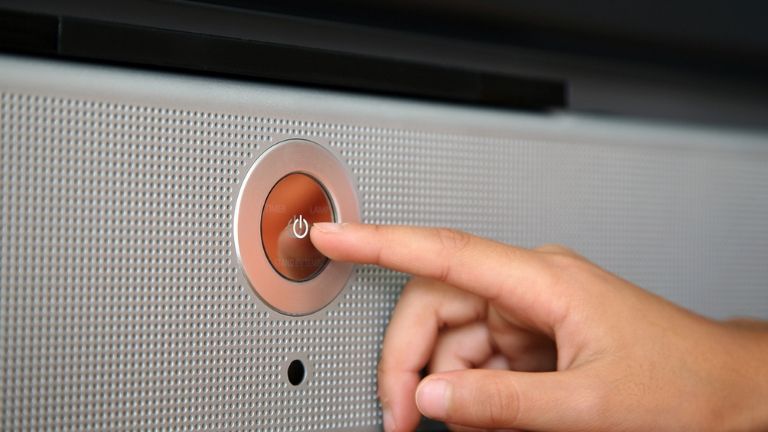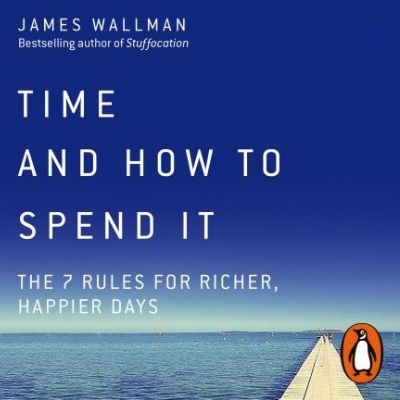Time management is less about to do lists and work productivity and more about how you use your free time – Allison Kroll reports
These days we’re busier than ever – commuting, working, scrolling through Instagram, keeping up-to-date with our favourite TV – who has time for anything else?
Cultural commentator and author James Wallman’s latest book, Time and How to Spend It: The Seven Rules for Richer, Happier Days details how to effectively use your free time in ways that will improve your entire life.
‘The popular assumption is that no skills are involved in enjoying free time, and that anybody can do it,’ Wallman says.
‘Yet the evidence suggests the opposite: free time is more difficult to enjoy than work. Having leisure at one’s disposal does not improve the quality of life unless one knows how to use it effectively, and it is by no means something one learns automatically.’
On average, we have about 5-6 hours of free time a day
We’re all super busy – but we also have more leisure time than ever before. On average, Americans have about five hours and 14 minutes of free time each day, and Britons about five hours and 49 minutes.
With that much free time – why does it feel like we are constantly busy? Wallman says it’s the following that’s eating up all our time:
- Smartphones and digital devices eat up 60 percent of our leisure time
- Too many incoming messages and demands on our time
- FOMO (Fear of missing out)
- Leisure time isn’t taught and is often trivialized or belittled
- We associate status with achievements at work, instead of enjoyment
In short, we are simply misspending our time. Learning how to manage your free time will help you perform better at work and all other areas of life – from relationships to physical health, says Wallman.
We’ve chosen eleven small daily tasks mentioned in his book that will help you manage your leisure time better – and ultimately make you happier.
1. Make a happiness checklist (not a to-do list)

One of the first rules is very simple – make a checklist each day or week. But, instead of including work-related tasks on the list, write down two or three achievable tasks that you can accomplish that will make you happier.
‘Life used to be simple, but today, with its myriad options, it has become too much plane for one person to fly,’ he says. ‘We all need a checklist.’
Wallman compares our need for a checklist with how the aviation company, Boeing, solved a critical problem with the Model 299 airplane in 1935. The new plane was state-of-the-art – but even their most experienced pilot could not fly it successfully. There were too many steps to remember.
‘In order to solve the complicated problem of remembering, they invented something so simple it sounds a bit silly now,’ he says. ‘Since it wasn’t in the mechanics, the problem they were looking to fix was the human operator.’
If our lives become too stressful to focus on things that make us happy, we need to break them down into simple steps.
The problem wasn’t knowledge or ability – it was how to focus someone’s attention to make sure that they completed all of the tasks that they needed to complete.
This can also be applied to how to effectively manage our free time. If our lives become too stressful to focus on things that make us happy, we need to break them down into simple steps.
‘When something simple becomes complicated, we need a new way to approach it,’ Wallman says. ‘This new way should do two things. It should make the complex thing elementary again. And it should ensure that we get the basics done right.’
So – if you find yourself too busy to fit in ”me” time – make a checklist. This way you will ensure that you can accomplish each of the things that are crucial to your happiness.
Here’s my happiness checklist for the day:
- Do Pilates in the morning
- Have a coffee on the balcony before leaving the house
- Take 30 minutes in the afternoon to journal
- Call a family member this evening
2. Say ”yes” more

Focus on being the creator in your own story, Wallman suggests. We so often let life fly by as we spend all of our time working or interacting with technology. Wallman argues this takes the art of experiences out of our lives.
The next time you’re asked to try something new – whether it be a new fitness class or an exotic type of food – say yes. You won’t regret it.
He compares modern life to a ”hero’s journey” – like in Star Wars or Harry Potter. The heroes face challenges in their lives that they must confront head-on. At the end of the story when the hero successfully makes it through – their world is better, completely changed.
‘Modern life is full of opportunities,’ Wallman says. ‘Each opportunity is, in some way, a call to adventure. The more you say ‘’yes’’ the more often you’ll cross the threshold and start down a road of trials.’
‘Don’t worry whether or not you think the adventure is for you…say ‘’yes’’ to the call to adventure, make it happen, and see where it leads.’
Use your free time to try new things, because experiencing life firsthand is a surer way to happiness than experiencing it through a screen.
3. Do a 5/2 Detox with your phone

A more challenging rule in the modern world is to put down your phone – frequently. Wallman even advocates a phone 5/2 Detox. This is when you only use your phone for five days out of the week, and turn it off on the weekends.
One of the biggest misuses of time, according to Wallman – is the addiction to our mobile phones.
Eight out of ten people check their phones within 15 minutes of waking up, and the average person checks their phone 150 times per day. Extreme users pick up their phone up to 300 times per day – which averages to about once every three minutes while they’re awake. Wow.
Eight out of ten people check their phones within 15 minutes of waking up, and the average person checks their phone 150 times per day.
If you aren’t sure about the extent of your phone addiction, Wallman created a short quiz to help determine if you’re an addict.
Here are a few questions from it:
- Do you check your phone first thing in the morning?
- Does your family complain about the amount of time that you spend online?
- Do you find yourself in spare moments, or even when you’re in the middle of something, checking your phone ”just in case”?
- If you find yourself somewhere with no connection, do you feel anxious or worry that you might be missing out on something?
- Do you ever catch yourself choosing to spend time online instead of spending time with your family, friends or your partner?
If you answered yes to most of those things – it might be time for a detox. Even if the 5/2 Detox cramps your style, living a phone-free lifestyle a couple of days a week is possible.
‘Remember how people used to do it: they’d agree where they were going to meet and meet there, about that time,’ Wallman says. ‘Instead of phoning your friend as you arrive, be an adventurer and look for them instead.’
If this is unrealistic for you – try turning off your phone notifications and keeping it out of your room at night.
4. Turn off the TV at the weekend

Another technology-related rule to follow is turning off the TV for the weekend. This frees up time to do other things that will make you happy – the things you never have time for.
If you aren’t spending your weekends binging Netflix, suddenly you have hours to spend with your friends and family or take up the hobby you’ve been wanting to start.
Wallman suggests taking it a step further than just turning off the TV. He says the best way to keep from turning it on is to hide it when you aren’t using it. Better yet – arrange your living space in a way that isn’t centred around the tube.
‘We’re creatures of habit who follow the most obvious path,’ he says. ‘If you can architect the design of your home so the TV doesn’t dominate your social space, you’ll just start watching it less.’
5. Make time for silence each day

An important rule for happier days that Wallman discussed at length is the need for transformation – the importance of becoming the best possible version of you.
We’ve all heard advice like this before, but Wallman’s method is a little different. He describes how to achieve your personal best through experiences. His three degrees of transformation will help you decide how your chosen activities are helping you on your path to becoming who you want to be.
Silent meditation is an example of ”go and become” method of transformation. This is when you choose to partake in an activity purely because you will achieve personal growth from it.
‘Take yourself a place far from usual distractions, probably in nature, and allocate a time to be silent,’ he says. ‘Try to quiet your inner voice too. You will emerge different.’
Silent meditation is an example of ”Go and become” method of transformation.This is when you choose to partake in an activity purely because you will achieve personal growth from it.
Here are some examples of other experiences you can have that will help you ”go and become” who you want to be, taken from Wallman’s book:
- Go to the gym, take a new fitness class
- Learn a new style of cooking
- Go to a yoga retreat
- Learn a new skill (take a language or art course)
- Walk the Camino de Santiago
The other two degrees of transformation are ”fly and flop” (Eg. Go on holiday to hang out on the beach) and ”find and seek” (Eg. Go on a hike in place you have never been before).
The best experiences, Wallman says, involve all three. During the week, the best thing to do is sit in silence for a few minutes and learn about yourself.
6. Do something that’s really nothing fancy

Have a cup of your favourite tea. Go outside and sit next to a beautiful tree. Admire the stars in the night sky. Do something that you really enjoy – be present in the moment and notice how much you love it.
An important aspect of finding happiness in your everyday life is enjoying both ordinary and extraordinary moments.
‘To have any chance of being happy, so one study found, you have to enjoy ordinary experiences,’ Wallman says.
‘The best place to find happiness is in little everyday pleasures: a smile from a stranger, a tune you like, a message from a friend, the sunlight through the trees, the feeling of rain on your face, your dog’s wagging tail.’
Even small, simple daily tasks can become extraordinary if you give them the right ritual, he says.
7. Get crafty

If you’re looking for something creative to add to your checklist – why not start a new project?
‘Humans are happier when we’re fully engaged, taking on an intensely difficult challenge that focuses all of our energy,’ Wallman says.
The idea that you need to be lounging around relaxing during your free time is a myth. This is why it is important to choose a non-work related project to complete during your spare time.
The idea that you need to be lounging around relaxing during your free time is a myth.
It should be something that can be broken up into small steps and given a small amount of attention each day, or a larger amount of time on the weekend.
‘Pick a project – paint a wall, fix the fence, sort out your wardrobe, mosaic a pot, understand what Nietzsche is on about, write a poem or screenplay – set a deadline, and go get it done,’ he says.
‘It doesn’t matter if you complete it on time, but it does matter that you finish it, you tidy up the loose ends into some kind of end point, and that you feel good about what you achieved.’
8. Have lunch with an old friend

Fostering relationships with the people around you is also a key to happiness – lonely people are generally not as happy as those who have an active social life.
‘Loneliness is fatal,’ Wallman says. ‘The three amigos of isolation – social isolation, loneliness and living alone – increase your chances of dying by 26 percent, 29 percent and 32 percent respectively.’
Going out of your way to have lunch with a friend or visiting a neighbor who lives alone will improve your relationships with the people around you, and the relationship that you have with yourself.
Make it a rule to spend face-to-face time with people that you don’t see every day at work. Add it to your checklist.
9. Do something for someone else

We all desire status and to be significant in the lives of other people. A way to increase your significance is to make time each day, or week, to help someone out.
An important reason that we find ourselves impossibly busy is because we associate status with our achievements in the workplace. But, as Wallman points out, there is another way to achieve a high status to the people around you – help them when they are struggling.
An important reason that we find ourselves impossibly busy is because we associate status with our achievements in the workplace.
‘Not to get something back, but for the pure, simple, intrinsic pleasure of doing something for someone else,’ he says.
Studies show the giving both money and giving time are likely to lead to greater happiness.
He suggests tidying an elderly neighbor’s garden, or simply asking the people around you if they need a hand with something.
10. Find a ”free time” mentor

Mentors are nothing new to the workplace – but have you ever thought to find one for your leisure time?
If you want to try something new – maybe yoga or boxing – find someone who knows more about it than you, and figure out a way to try it with them. If you have a friend who’s really into hiking, ask if you can join them next time.
‘Too often we struggle, and think that asking for help is a sign of weakness,’ Wallman says.
In the world of work, we find people with more experience to guide us and ensure that we are completing all tasks in the best possible way. We rarely do this in our free time.
Having a mentor to enjoy your time with and remind you to practice your new hobby will do wonders for keeping you motivated to continue the experience.
‘Once you’re on your adventure, if you find others who like it too, it’ll be easier to keep going,’ he says.
11. Get lost

It’s important to mix things up sometimes – break out of your daily routine. One way to do so is to get lost in your city (or a new one). Explore your surroundings without a map or phone. See how you feel after you successfully navigate somewhere without the help of technology.
As Wallman says, ‘Let serendipity into your life.’
During the week, make an effort to observe new things about the places you normally hurry by on your commute. You may spot something new and exciting along the way.
‘All experiences set off a domino line of positivity that leads directly to happiness: experiences lead to story, story leads to connection, connection leads to relationships, relationships lead to happiness,’ he says.

Time and How to Spend It: The 7 Rules for Richer, Happier Days (2019, Penguin Random House, £9.99) is available to purchase on Amazon.
More Healthista Content:
5 celebrities you didn’t know had anxiety
This guided meditation will improve your relationships
5 healthy recipes to help balance your hormones
5 anti-ageing foods proven by science
5 steps to a long life (and 2 routes to a shorter one)
Like this article? Sign up to our newsletter to get more articles like this delivered straight to your inbox.





















































